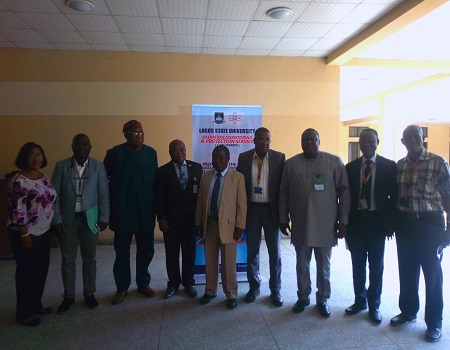Prof. Olanrewaju Fagbohun, Vice-Chancellor, Lagos State University (LASU), says ensuring the health and well-being of workers handling radioactive materials should be of utmost concern to health physics groups in the country.
He said that this was important as the use of radiation material in all sectors continue to increase.
Fagbohun, represented by Prof. Oyedamola Oke, Deputy Vice-Chancellor, Administration, said this at the 10th year Anniversary of the LASU Radiation Monitoring and Protection Service (LASU- RAMPS), in Lagos.
The topic of the anniversary lecture was: ‘Radiation Protection in Application of Ionizing Radiation Monitoring and Protection Service’.
ALSO READ: Embrace dialogue, LASPOTECH appeals to striking unions
The Vice-Chancellor charged health physicists to evaluate the consequences of long term exposure, as radioactive sources continue to increase in human activities.
He said the balance between risk and benefit was the main inspiration of the Radiation Monitoring and Protection Services towards the control of exposure of people to harmful radiation.
“As radioactive sources continue to play an increasing role in human activities, from agriculture to food processing, it is vital that health physicists not only monitor but also assess, evaluate and compare the consequences of long-term exposure.
“It is also important that Nigeria research findings inform research policy and scientific discussions at the local, national and international level,” he said.
According to him, numerous studies attest to the widespread and improper use of radioactive materials in facilities across Nigeria, while personnel handling the equipment often had little or no training in appropriate techniques for their usage.
The professor said Lagos State had the highest concentration of industry, indirectly having a high amount of emitted gasses such as carbon monoxide and radioactive substance.
He said, as such, there was the need to personally monitor individuals occupationally exposed to ionizing radiation in Lagos and Nigeria in general, and also exercise some intervention controls, training and safety management.
According to him, this is necessary as the use of radioactive materials continue to rise in a number of sectors, including health, oil, research and education, while the ability of agencies to monitor the use of radioactive materials in the various industries remain deficient.
In his remark, Mr Olayinka Amuni, Registrar, LASU, said the purpose of radiation protection is to prevent deterministic health effects and minimise probabilistic health effects to the extent possible.
Accordingly, he said standards have been set for radiation doses to which people may be exposed and determining safety measure and work procedures are necessary to ensure the health of workers and members of the public.
Prof. Akintunde Balogun, Director, LASU-RAMPS, in his lecture, said the general trend of a rapid increase in medical radiation was due to increasing population.
Balogun said while the advantages of radiation were numerous, it could be abused, and if so, the consequences are terrible and could lead to skin burns, epilation, eye defects and cancer, among others.
Mr Olatunji Okoya, Director, Nigeria Nuclear Regulatory Authority (NNRA), lauded the standard of facilities at the LASU -RAMPS, with its accreditation by appropriate agencies.
Okoya urged the university management to collaborate with multinational corporations such as Shell and Chevron, to make use of their facilities for increased revenue generation.
Dr Bayo Aderiye, Chairman, Health Service Commission, Lagos State, called for an increase in the level of awareness to the public and the government on the effect of radiation and the need to enforce and implement policies therein.
“The level of spermatozoa of men in the present generation is very low compared to the past; who knows the cause? Therefore, radiation is an issue of concern,” he said.
The News Agency of Nigeria (NAN) reports that the LASU -RAMPS was officially commissioned on Nov. 27, 2008, by the then Pro-Chancellor, Mr Akin Kekere-Ekun, under the leadership of the then Vice-Chancellor, Prof. L.A. Hussain.
It had its first certification for Radiation Quality Assurance/Quality Control Services and Workplace monitoring to authorised users of Diagnostic Radiology equipment in Nigeria on Aug. 19, 2008.
The unit got her Dosimetry Service Provider License on April 9, 2009, by Nigerian Nuclear Regulatory Authority after acquiring its own RADOS TLD Reader.




